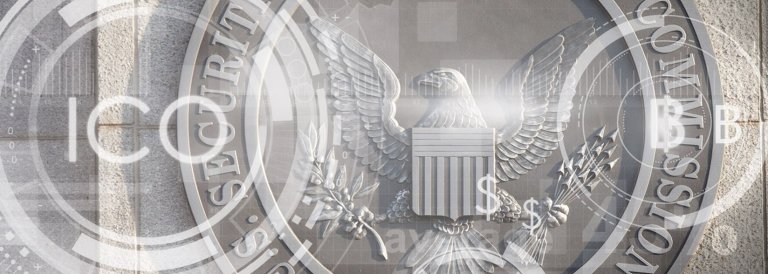 Investigations by the SEC Signal Crypto and ICO Regulations Tightening
Investigations by the SEC Signal Crypto and ICO Regulations Tightening Investigations by the SEC Signal Crypto and ICO Regulations Tightening

Photo of SEC from Shutterstock
Arguably the most contentious issue surrounding initial coin offerings (ICOs) is SEC compliance. The crux of the matter lies on whether tokens issued through the blockchain are securities or “utility tokens.” New regulatory actions from the Securities and Exchange Commission clarify the agency’s stance.
ICOs Revolutionize Fundraising
ICOs have shaken up finance. Raising money was once a multi-million dollar process. An initial public offering is an enormous undertaking that requires thousands of hours of accounting, legal, and financial scrutiny.

ICOs have revolutionized public fundraising. Now, any entrepreneur with an idea and a whitepaper can raise millions.
However, the ICOs also allow for scams and Ponzi schemes to proliferate. There have been instances where founders raise millions and vanish, and Ponzi schemes like BitConnect have scammed thousands of participants.
Are ICO Tokens Classified as Securities?
An ICO is usually an offering where an organization sells “tokens,” similar to digital credits, for access to a blockchain based service.

By claiming that these tokens are exclusively for access to a blockchain based platform these organizations can claim that tokens are not subject to securities regulations.
These organizations argue that unlike a security — a financial instrument which carries the expectation of future economic gain — a utility token is a prepayment for a service.
To exacerbate matters the SEC has been timid to establish clear rules. Without clear guidelines startups that do attempt to follow securities laws are at a distinct disadvantage over their competitors.
This isn’t to say that the SEC is wholly opposed to the new way of raising money. What’s important is that investors are protected from unscrupulous actors. As said by SEC Chairman Jay Clayton:
“We seek to foster innovative and beneficial ways to raise capital, while ensuring – first and foremost – that investors and our markets are protected.”
The DAO Investigation
Recently the SEC has asserted itself. In July of 2017 enforcement actions towards The DAO clarified the agency’s stance towards ICOs.
The DAO (Decentralized Autonomous Organization) was a novel, open-source, decentralized business model built on the Ethereum blockchain using smart-contracts. Unlike traditional businesses, The DAO had no conventional management structure or board of directors.

In the investigation, the SEC determined that The DAO violated federal securities laws with an unregistered offer when DAO Tokens were offered in exchange for Ethereum.
Although The DAO described the action as a “crowdfunding contract” it did not meet the Regulation Crowdfunding exemptions to qualify as such. Pursuant to the regulation, The DAO did not register as a funding portal which in turn invoked SEC action.
This was one of the first major enforcement actions towards an ICO by the SEC. If an ICO is raising money, even if it’s in a decentralized manner, it is not exempt from compliance with securities regulations.
As reiterated by Stephanie Avakian, Co-Director of the SEC’s Enforcement Division:
“The innovative technology behind these virtual transactions does not exempt securities offerings and trading platforms from the regulatory framework designed to protect investors and the integrity of the markets.”
The Munchee Report
In December of 2017, the SEC released another investigation. The California-based company Munchee sought to raise $15 million through an ICO. The company sold “MUN” tokens with the intent to improve an iPhone app focused on restaurant meal reviews and buying and selling restaurant services using MUN tokens.
Where the company ran afoul, as stated by the SEC order:
“In the course of the offering, the company and other promoters emphasized that investors could expect that efforts by the company and others would lead to an increase in value of the tokens. The company also emphasized it would take steps to create and support a secondary market for the tokens. Because of these and other company activities, investors would have had a reasonable belief that their investment in tokens could generate a return on their investment.”
The commission found that Munchee’s conduct “constituted unregistered securities offers and sales.” Representatives from Munchee agreed to cease and desist all ICO related activities.
The SEC’s cease and desist towards Munchee may act as a harbinger for future ICO litigation.
In response to the Munchee Order, William Hinman, Director of the Division of Corporate Finance stated that:
“Investors need the essential facts behind any investment opportunity so they can make fully informed decisions, and today’s Report confirms that sponsors of offerings conducted through the use of distributed ledger or blockchain technology must comply with the securities laws.”
Avoiding Securities Classification by the SEC

The standard for determining security classification is the Howey Test. As long as an investor would reasonably expect a token to generate “profits that are derived from managerial and entrepreneurial efforts of others,” then that offer is likely a security.
Whether are not the investor’s profits are actually derived from an ICO team is irrelevant. The classification hinges on investor’s perception before the purchase of the token. Any ICO that leads investors to believe they may earn future profits from a token risk the ire of the SEC.
Warnings Signs for Investors
The SEC Office of Investor Education and Advocacy issued an investor bulletin to help investors identify the warning signs that an ICO is not registered. Any of the following points could indicate that a token is an unregistered security, and thus a higher risk investment:
- “Guaranteed” high investment returns with little or no risk.
- You received the offer unsolicited and you don’t know the offerer.
- You’re pressured to buy RIGHT NOW.
- No net worth or income requirements.
Note that the SEC requires securities offerings to be registered unless an exemption from registration applies.

Most exemptions require that investors are accredited or have other income and net asset-based investment limits. Additionally, if an ICO claims that it is utilizing “Regulation Crowdfunding” exemptions, know that a crowdsale cannot exceed more than $1 million in raised funding.
ICOs and investors alike need to be wary of the risks of unregistered securities, and the SEC has made it clear they are willing to act:
Regardless of whether the issuing entity is a traditional company or a decentralized organization, regardless of whether those securities are purchased using U.S. dollars or virtual currencies, and regardless of whether they are distributed in certificate form or through distributed ledger technology, federal securities laws still apply.





































































































